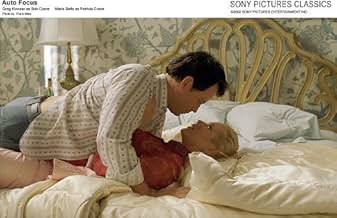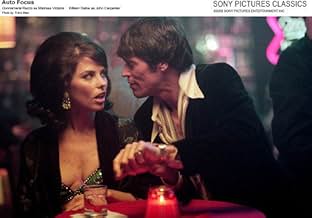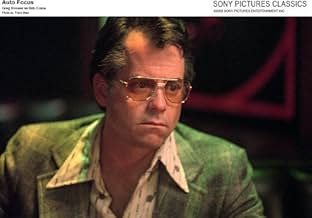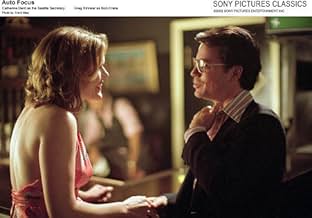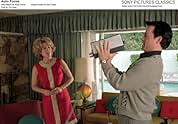The life of TV star Bob Crane and his strange friendship with electronics expert John Henry Carpenter.The life of TV star Bob Crane and his strange friendship with electronics expert John Henry Carpenter.The life of TV star Bob Crane and his strange friendship with electronics expert John Henry Carpenter.
- Awards
- 6 nominations total
Michael E. Rodgers
- Richard Dawson
- (as Michael Rodgers)
DonnaMarie Recco
- Melissa
- (as Donnamarie Recco)
- …
- Director
- Writers
- All cast & crew
- Production, box office & more at IMDbPro
Featured reviews
Bob Crane (Greg Kinnear) is a radio DJ in Hollywood looking for acting work. In 1965, he gets an offer for an unconventional project. It's a comedy in a Nazi POW camp. Hogan's Heroes becomes a big hit. He befriends home video salesman John Carpenter (Willem Dafoe) in a strip club. Unlike his public wholesome image, his interests in strippers, sex, and home video are heightened by Carpenter and his state-of-the-art cameras. It's a toxic friendship of easy women, sexual proclivity, and hidden videos. In 1970, he divorces his wife Anne (Rita Wilson) and marries his co-star Sigrid Valdis, real name Patricia Olson (Maria Bello). Crane and Carpenter's friendship based on their sad common interest degenerates.
Director Paul Schrader often dives into the darker side of humanity. It's a sad portrait well delivered by Kinnear. On the other hand, the movie is not always great at delivering the danger and tension. For half of the movie, Bob Crane is not threatened with discovery. This keeps the tension low. It's got a chipper tone which is weird. It would have been nice to speed up the first half. It takes too long to get to his downfall. Willem Dafoe is equally strong and necessary for this movie to work. There is interesting work here but this should be more intense.
Director Paul Schrader often dives into the darker side of humanity. It's a sad portrait well delivered by Kinnear. On the other hand, the movie is not always great at delivering the danger and tension. For half of the movie, Bob Crane is not threatened with discovery. This keeps the tension low. It's got a chipper tone which is weird. It would have been nice to speed up the first half. It takes too long to get to his downfall. Willem Dafoe is equally strong and necessary for this movie to work. There is interesting work here but this should be more intense.
This is a movie about a man's downfall; in this case, sex. I saw this right after 'Requiem for a Dream'(I guess I was in an addictive mood). This is a sad movie, but not on par with 'Requiem'. I never knew the sordid details about 'Col. Hogan', but this movie laid it out for me. The acting is very good. As other's viewers have noticed, the cinematography and music matches the decline of Crane's life. I was very depressed near the end. There is an obvious implication of his friend Carpenter in his murder, and outside of a court of law, many people would believe it. It's like a weak Oliver Stone/JFK, but still believable. Kind of like a required homework assignment that they may never get credit for, yet execute at 100 percent and show their merit. It wasn't a box office movie, but I believe it's worth watching, and it is exemplarary work by the actors. Maybe it needed more supporting character development, maybe longer screen shots.
Not having had a chance to see the movie first-run, I bought the DVD and was impressed with it. The movie itself was, to borrow a phrase from another review on this site "brilliantly disturbing." Those of us who remember when Bob Crane was murdered at an apartment in Scottsdale, AZ while doing dinner theater gig; that was weird in of itself. After all who would want to kill good old Colonel Hogan? I remember watching Crane on the show, and also on talk or game shows. He seemed so together, self-assured and quick-witted. So it was even more of a shock to find out about his double-life, which this movie covers so well although it is perhaps a bit misleading in spots.
Greg Kinnear does very good as Crane, especially in the latter scenes of the film. I think the part of Bob Crane would be somewhat difficult to play. Crane's legendary status is caught up not in his career itself, but his life other "on camera" life. A life that ended with his bludgeoning death (by blows from a camera tripod.) in June, 1978, just two weeks before what would have been his 50th birthday. Wilhem Dafoe is even better as the creepy John "Carpie" Carpenter, a video salesman who Crane meets on the set of Hogan's Heroes. Virtually all the supporting cast is also quite good. Particularly good are Kurt Fuller as Werner Klemperer/Col. Klink and Rob Leibman, who plays Crane's agent who watches helplessly as Crane's career and personal life veer out of control and plummet.
Carpenter, an electronics expert, at the time worked for Sony, selling the new and expensive technology of videotape players to mostly celebrities or others wealthy enough to afford them. The movie takes the viewer through the mid-late 1960's as Crane and Carpenter, both sex addicts, videotape their seemingly every night exploits with women they pick up from night clubs. This is no problem for Crane who was handsome and famous. Carpenter was portrayed as a hanger-on, along for the ride, and taking Crane's "seconds." Crane, married with children is at first able to hide his double-life from his family, although his wife is suspicious of his roving eye.. As a sidebar, there are some interesting tidbits in the movie about the development of videotape in the 60's into the 70's. After the cancellation of Hogan's Heroes in 1971 and his expensive divorce (his wife found photographic evidence of his escapades), Crane's sex addition seemingly worsens. He remarries, this time to an actress who played Col Klink's secretary in the Hogan's Heroes who tells him his dalliances are okay with her. They have a son soon after they are married and even she grows weary of his being away so much with Carpenter.
The mood of the film is in the beginning almost light-hearted, almost campy at times. . As the film continues and as Crane's personal life steadily implodes, professional life goes on the decline, a sense of darkness and desperation engulf the film. This is reinforced superbly by the hues on screen and the background music. The symbiotic relationship between Crane and Carpenter are portrayed so convincingly. Crane needed Carpenter for his video expertise and Carpenter needed Crane for the access to women. It is stunning how cavalier Crane was about picking up women and taping his sex acts, with or without their consent.
Crane is portrayed as a nearly broke totally washed-up B or C grade celebrity at the time of his murder. This was not necessarily the case. Crane in fact had made a lot of guest appearances on television series and game shows in the early and mid-70's. He had been signed to star in an ABC Movie of the Week shortly before his murder. Crane also owned a portion of Hogan's Heroes, and had received a royalty check in 1977 of over $95,000. Doing dinner theater was more a choice he had made, and he was making amounts off dinner theater that rivaled his royalty checks. Not a fortune, but a very decent living, especially for that time. To be sure he was strained by having to support one but two families, plus his addiction. He was not the big star he was, but not in oblivion, either. Only so much can be covered in the film's 90 or so minute running time, but the notion that his professional life was in smithereens was a bit misleading. Yet, many in Hollywood knew about his exploits and it no doubt cost him in professional opportunities. There is debate on both sides whether or not Crane at the time of his murder was attempting to change his life.
Near the end it is clear Crane had grown tired of "Carpie" and had basically told him the friendship as they knew it was coming to an end. This was just a day or so before his murder. Carpenter was arrested and tried years later for the murder but acquitted. He died in 1998, and the case officially remains unsolved.
Paul Schrader (Taxi Driver) directs so well this lurid and unflinching story. The DVD has lots of extras, including 3 different commentaries. The first by Kinnear and Dafoe, is good. Schrader's commentary is best as it offers a lot of insight into how they were able to make a relatively low-budget picture ($7 million I recall) look like they easily spent twice that amount. There is a third commentary was by the screenplay writers that I found dull. The deleted scenes are worth watching. For those interested in the Crane murder and the "whodunit" aspect there is a 45 minute feature entitled "Murder in Scottsdale" loaded with interviews and archival footage. The movie is based on Robert Graysmith's The Murder of Bob Crane, which I found to be interesting reading.
Greg Kinnear does very good as Crane, especially in the latter scenes of the film. I think the part of Bob Crane would be somewhat difficult to play. Crane's legendary status is caught up not in his career itself, but his life other "on camera" life. A life that ended with his bludgeoning death (by blows from a camera tripod.) in June, 1978, just two weeks before what would have been his 50th birthday. Wilhem Dafoe is even better as the creepy John "Carpie" Carpenter, a video salesman who Crane meets on the set of Hogan's Heroes. Virtually all the supporting cast is also quite good. Particularly good are Kurt Fuller as Werner Klemperer/Col. Klink and Rob Leibman, who plays Crane's agent who watches helplessly as Crane's career and personal life veer out of control and plummet.
Carpenter, an electronics expert, at the time worked for Sony, selling the new and expensive technology of videotape players to mostly celebrities or others wealthy enough to afford them. The movie takes the viewer through the mid-late 1960's as Crane and Carpenter, both sex addicts, videotape their seemingly every night exploits with women they pick up from night clubs. This is no problem for Crane who was handsome and famous. Carpenter was portrayed as a hanger-on, along for the ride, and taking Crane's "seconds." Crane, married with children is at first able to hide his double-life from his family, although his wife is suspicious of his roving eye.. As a sidebar, there are some interesting tidbits in the movie about the development of videotape in the 60's into the 70's. After the cancellation of Hogan's Heroes in 1971 and his expensive divorce (his wife found photographic evidence of his escapades), Crane's sex addition seemingly worsens. He remarries, this time to an actress who played Col Klink's secretary in the Hogan's Heroes who tells him his dalliances are okay with her. They have a son soon after they are married and even she grows weary of his being away so much with Carpenter.
The mood of the film is in the beginning almost light-hearted, almost campy at times. . As the film continues and as Crane's personal life steadily implodes, professional life goes on the decline, a sense of darkness and desperation engulf the film. This is reinforced superbly by the hues on screen and the background music. The symbiotic relationship between Crane and Carpenter are portrayed so convincingly. Crane needed Carpenter for his video expertise and Carpenter needed Crane for the access to women. It is stunning how cavalier Crane was about picking up women and taping his sex acts, with or without their consent.
Crane is portrayed as a nearly broke totally washed-up B or C grade celebrity at the time of his murder. This was not necessarily the case. Crane in fact had made a lot of guest appearances on television series and game shows in the early and mid-70's. He had been signed to star in an ABC Movie of the Week shortly before his murder. Crane also owned a portion of Hogan's Heroes, and had received a royalty check in 1977 of over $95,000. Doing dinner theater was more a choice he had made, and he was making amounts off dinner theater that rivaled his royalty checks. Not a fortune, but a very decent living, especially for that time. To be sure he was strained by having to support one but two families, plus his addiction. He was not the big star he was, but not in oblivion, either. Only so much can be covered in the film's 90 or so minute running time, but the notion that his professional life was in smithereens was a bit misleading. Yet, many in Hollywood knew about his exploits and it no doubt cost him in professional opportunities. There is debate on both sides whether or not Crane at the time of his murder was attempting to change his life.
Near the end it is clear Crane had grown tired of "Carpie" and had basically told him the friendship as they knew it was coming to an end. This was just a day or so before his murder. Carpenter was arrested and tried years later for the murder but acquitted. He died in 1998, and the case officially remains unsolved.
Paul Schrader (Taxi Driver) directs so well this lurid and unflinching story. The DVD has lots of extras, including 3 different commentaries. The first by Kinnear and Dafoe, is good. Schrader's commentary is best as it offers a lot of insight into how they were able to make a relatively low-budget picture ($7 million I recall) look like they easily spent twice that amount. There is a third commentary was by the screenplay writers that I found dull. The deleted scenes are worth watching. For those interested in the Crane murder and the "whodunit" aspect there is a 45 minute feature entitled "Murder in Scottsdale" loaded with interviews and archival footage. The movie is based on Robert Graysmith's The Murder of Bob Crane, which I found to be interesting reading.
Wow, is Greg Kinnear nothing short of amazing in this film or what! An incredible performance as Bob Crane, seriously virtuoso. When, towards the end, he visits his agent and is all messed up, and starts saying "sex is normal. I'm normal" - Kinnear reaches a pinnacle in his young film acting career. I have always felt that actors ascend to the next level of craft and stardom when they breakthrough with a biographical role; see - Denzel Washington in Malcom X, Ben Kingsley in Ghandi, Robert Downey Jr in Chaplin, Peter O'Toole in Lawrence of Arabia. And now Greg Kinnear has made that leap with Auto Focus, a well-crafted and seductive film by Paul Schrader, Hollywood's last bastion of non-sugar coated filmmakers. Basically the story of Hollywood's most intriguing unsolved murder, Auto Focus also pulls back the curtain on "good guy" Bob Crane's lecherous and painfully discombobulated private and secret life. What is also amazing about this film is how is records the birth of video and the VCR. Bob Crane turns out to be one of the pioneer "users" of this technology. When we see or hear video, video cameras, or VCRs, we probably automatically think of home movies, recording episodes of Star Trek, or the Star Wars prequels' lack of cinematic quality. When Bob Crane heard about video cameras and VCRs, he automatically thought of sex. Though the film makes no mention of it, it is quite prophetic in showing us how the technology of video created hard-core pornography and turned it into a billion dollar industry. If you think about it, nothing has profited more from video than porno, and nothing ever relied so dearly on video like porno. Bob Crane instinctively felt this, though he never was a pornographer, so to speak; he knew that sex and video can go hand in hand. Unfortunately, this was also his downfall. Like most Paul Schrader writ or directed films, by the end you get that queasy feeling, the feeling you get at the end of Goodfellas, the feeling of sadness that this great ride is over and the feeling of emptiness and loss that all that greatness came crashing down. Bob Crane's descent into moral madness can be sickening, especially when juxtaposed with Hogan's Heroes. I almost felt the desire to shower, to cleanse myself after viewing this film. I love movies that produce reactions from me, movies that linger for days. This is one of them.
As anyone who is reading this knows, this was the story of TV's Bob Crane, star of "Hogan's Heroes," a popular show in the 1960s. The story of Crane, the one that makes him a subject of a major motion picture of his life, are two things: 1 - the good-guy TV hero was, behind the scenes, a huge sex addict; 2 - he was murdered, with no one ever convicted of the crime. To this day, it is still unsolved.
The movie hints very strongly that the killer was Bob Carpenter, played here by Willem Dafoe. Carpenter was a close friend of Crane's. Greg Kinnear does a credible job of portraying the television star.
However, the part about Crane's murder is only dealt with in the final minutes of the film! That was very disappointing and I was hoping to find out something or at least be given more information. They just kind tacked this on the end of the film.
Most of the film was about Crane's and Carpenter's escapades with women.....lots of women, beautiful and big-chested women, which you see in abundance in this film. Dafoe is the sleazy friend who introduces Crane to the beginning of the VCR age. That led to a whole bunch of sex-on-film and really whetted Crane's big sexual appetite.
Anyway, for people who watched "Hogan's Heroes," and there were plenty, this is a bio of him and perhaps, for those who know nothing about his death, who killed him.
The movie hints very strongly that the killer was Bob Carpenter, played here by Willem Dafoe. Carpenter was a close friend of Crane's. Greg Kinnear does a credible job of portraying the television star.
However, the part about Crane's murder is only dealt with in the final minutes of the film! That was very disappointing and I was hoping to find out something or at least be given more information. They just kind tacked this on the end of the film.
Most of the film was about Crane's and Carpenter's escapades with women.....lots of women, beautiful and big-chested women, which you see in abundance in this film. Dafoe is the sleazy friend who introduces Crane to the beginning of the VCR age. That led to a whole bunch of sex-on-film and really whetted Crane's big sexual appetite.
Anyway, for people who watched "Hogan's Heroes," and there were plenty, this is a bio of him and perhaps, for those who know nothing about his death, who killed him.
Did you know
- TriviaThe leather jacket that Greg Kinnear wears while playing Bob Crane in the Papa Schultz (1965) scenes of this movie is the one that the real Crane actually wore during the filming of that TV series. Crane's son Robert David Crane loaned the jacket to Kinnear for this movie. Prior to the original "Hogan's Heroes" show, Frank Sinatra wore this exact same jacket in L'express du colonel von Ryan (1965).
- GoofsThere is a glimpse of the famous Capitol Records building painted silver. At the time of the film, it was actually painted black to resemble a stack of records.
- Quotes
Bob Crane: I think it's perfect for me. I mean, this character Hogan, he's quick on his toes, he's hip, he's a con artist. I don't wanna jinx it, but I think it's what I've been working toward my whole career!
Anne Crane: Really? You've been working towards a Holocaust comedy?
Bob Crane: Ann!
Anne Crane: What, Bob?
Bob Crane: Please, not in front of the children! They look up to me!
Anne Crane: They're small. They look up to everyone.
- Alternate versionsThe following deleted scenes appear on the DVD:
- Victoria finds Bob's body.
- Hogan's Heroes Montage
- Bob unloads drums and some dirty magazines fall out.
- Anne and Bob talking by the pool.
- Anne in the darkroom.
- ConnectionsFeatured in Auto Focus: Featurette (2002)
- SoundtracksSnap!
Written by Paul Schrader and Angelo Badalamenti
Performed by David Johansen (as Buster Poindexter)
Produced by Brian Koonin
- How long is Auto Focus?Powered by Alexa
Details
Box office
- Budget
- $7,000,000 (estimated)
- Gross US & Canada
- $2,063,196
- Opening weekend US & Canada
- $123,761
- Oct 20, 2002
- Gross worldwide
- $2,704,951
- Runtime
- 1h 45m(105 min)
- Color
- Sound mix
- Aspect ratio
- 1.85 : 1
Contribute to this page
Suggest an edit or add missing content







